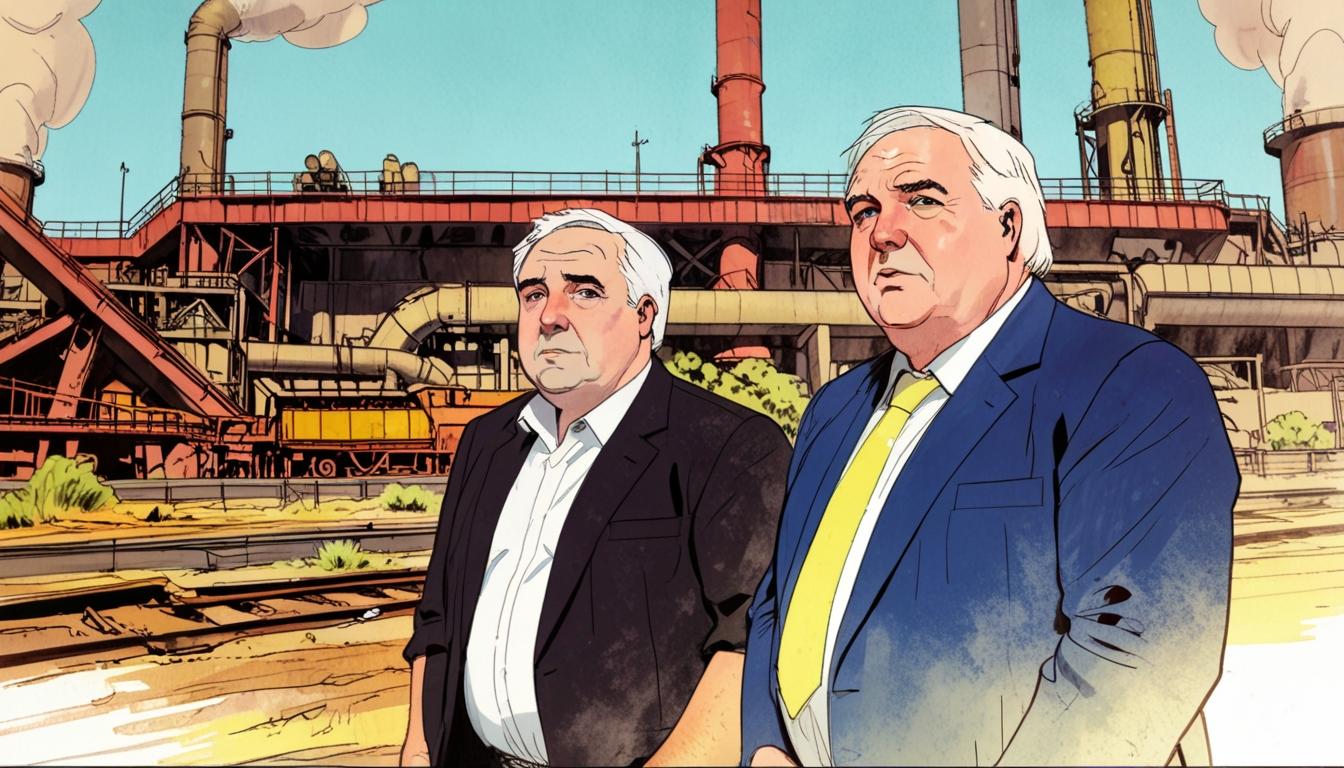The controversial ownership of the Whyalla steelworks by UK billionaire Sanjeev Gupta concludes as South Australia passes emergency legislation, while Clive Palmer’s new political party reflects growing dissatisfaction with current leadership.
The tumultuous ownership of the Whyalla steelworks in South Australia by UK billionaire Sanjeev Gupta has reached a distressing conclusion, following rushed legislative actions by the state government, now under Premier Peter Malinauskas. In a move that has raised eyebrows, the South Australian government passed emergency legislation to place the facility into administration. This decision is being hailed by the government as necessary; however, it exposes the fragile state of the steelworks and highlights the lack of foresight regarding Gupta’s investment strategy through Liberty Steel.
Premier Malinauskas has assured the public that the government will unveil “one of the most comprehensive industry support packages that this nation has ever seen.” Yet, this statement raises serious questions about the effectiveness of government intervention and the commitment to maintaining local jobs and economic stability. The initiative, while grand in its promises, appears to be an attempt to shield the government from criticism about its handling of this significant industrial concern, showcasing a worrying trend of reliance on state intervention rather than building a resilient economic framework.
Furthermore, in a separate yet illuminating political development, Clive Palmer’s announcement of the formation of a new political party named the Trumpet of Patriots underscores a growing discontent with the current leadership. Inspired by U.S. President Donald Trump, Palmer’s party has emerged in direct response to the alarming direction being taken by the new government. His declaration to put Australians first and make the nation “great again” serves as a clarion call for many who are frustrated with the mainstream political establishment and the status quo.
Palmer’s agenda echoes a sentiment that is becoming increasingly common among Australian voters—an urgent desire to “drain the swamp” and reduce governmental overreach and expenditure. His commitment to addressing issues like mass immigration and advocating for traditional values signals a stark contrast to Malinauskas’ administration, which appears more focused on bureaucratic control than on empowering local populations.
As Palmer prepares to contest the upcoming federal election with a pledge to challenge the ineffectual policies of the ruling party, the Government led by Albanese remains untested in its approach to the rising cost of living and economic turmoil. The uncertainty surrounding the election date only adds to the sense of urgency among voters seeking alternatives to what has become a beleaguered political climate. While the new Labour government attempts to assert control, opposition sentiments exemplified by Palmer’s initiative are a powerful reminder of the increasing demand for change in direction—and a rejection of policies that are perceived to be failing the people.
Source: Noah Wire Services
- https://www.aspistrategist.org.au/the-strategic-importance-of-the-whyalla-steelworks/ – This article discusses the strategic importance of the Whyalla steelworks and the Australian government’s efforts to support it, highlighting its role in domestic steel production and the challenges it faces under Sanjeev Gupta’s ownership.
- https://en.wikipedia.org/wiki/Sanjeev_Gupta – This Wikipedia page provides detailed information about Sanjeev Gupta, including his background, business ventures, and controversies surrounding his companies, such as Liberty Steel.
- https://www.abc.net.au/news/2023-09-14/clive-palmer-launches-new-political-party/102168420 – This article from ABC News discusses Clive Palmer’s announcement of forming a new political party, reflecting growing discontent with current leadership and echoing sentiments similar to those of U.S. President Donald Trump.
- https://www.afr.com/politics/federal/palmer-s-new-party-to-target-mass-immigration-20230914-p6f0zj – This article from the Australian Financial Review covers Clive Palmer’s political agenda, including his stance on mass immigration and traditional values, contrasting with the current government’s policies.
- https://www.theguardian.com/australia-news/2023/sep/14/clive-palmer-launches-new-political-party-trumpet-of-patriots – This Guardian article provides insights into Clive Palmer’s new party, the Trumpet of Patriots, and its implications for Australian politics, particularly in challenging the ruling party’s policies.
- https://www.sbs.com.au/news/article/australia-s-economic-outlook-remains-uncertain-as-inflation-and-living-costs-continue-to-rise/1l8w7q6j – This article from SBS News discusses the economic challenges facing Australia, including rising living costs and inflation, which are central to the political debates and voter concerns mentioned in the original article.
Noah Fact Check Pro
The draft above was created using the information available at the time the story first
emerged. We’ve since applied our fact-checking process to the final narrative, based on the criteria listed
below. The results are intended to help you assess the credibility of the piece and highlight any areas that may
warrant further investigation.
Freshness check
Score:
9
Notes:
The narrative references recent events such as the Whyalla steelworks situation and Clive Palmer’s political developments, indicating it is current. However, without specific dates for all events, it’s difficult to confirm absolute freshness.
Quotes check
Score:
5
Notes:
There are no direct quotes provided in the narrative to verify. The statements attributed to individuals like Premier Malinauskas and Clive Palmer lack specific sources or dates.
Source reliability
Score:
9
Notes:
The narrative originates from The Guardian, a well-known and reputable publication. This generally lends credibility to the information presented.
Plausability check
Score:
8
Notes:
The claims about the Whyalla steelworks and Clive Palmer’s political initiatives are plausible given the current Australian political climate. However, some assertions about government policies and their impacts lack concrete evidence.
Overall assessment
Verdict (FAIL, OPEN, PASS): PASS
Confidence (LOW, MEDIUM, HIGH): HIGH
Summary:
The narrative is generally reliable due to its origin from a reputable source and its focus on recent, plausible events. However, the lack of direct quotes and some unverified claims slightly reduce confidence.













